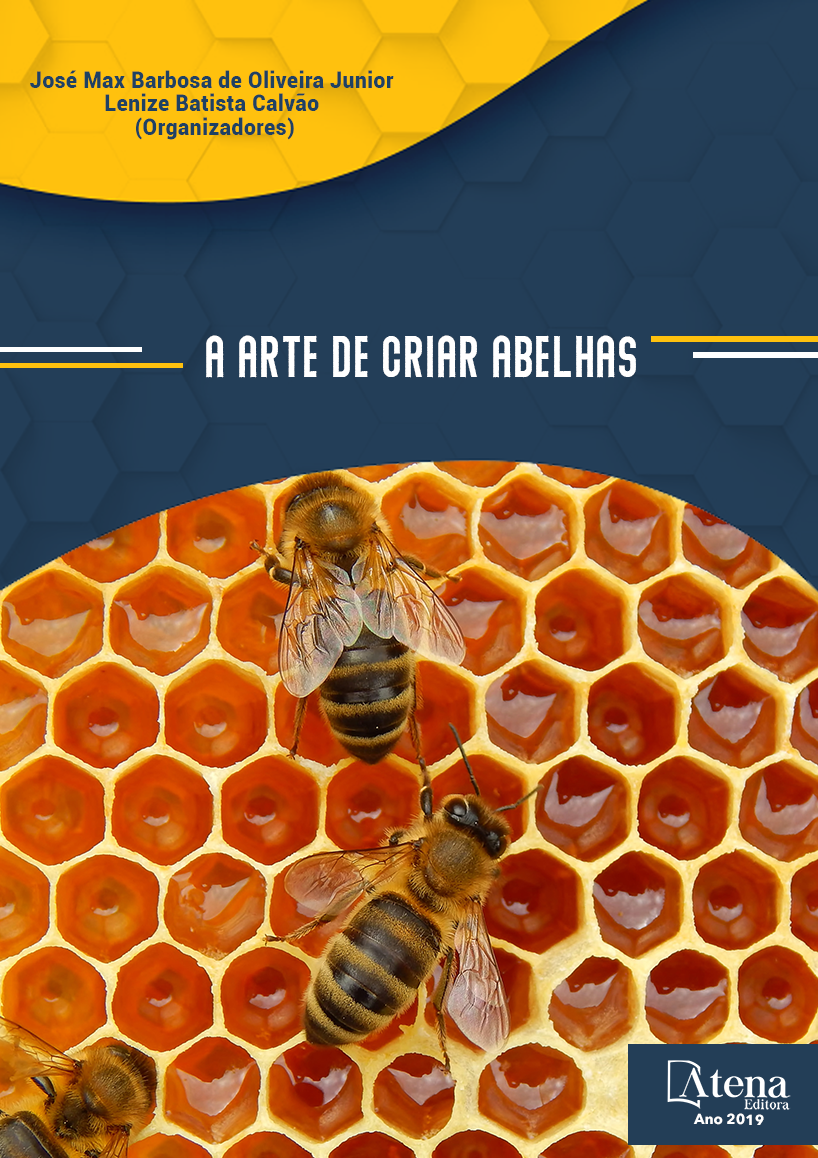
COMPORTAMENTO HIGIÊNICO DE ABELHAS MELÍFERAS AFRICANIZADAS EM ÁREA DE TRANSIÇÃO AMAZÔNIA CERRADO, NO TOCANTINS
O presente trabalho tem como
objetivo avaliar o efeito bimestral, ao longo do
ano, no comportamento higiênico de colônias
de Apis mellifera. O experimento foi conduzido
no apiário da Universidade Federal do Tocantins
(UFT), município de Araguaína, Norte do
Tocantins. Esta região, de transição Amazônia
Cerrado, é caracterizada pelo clima tropical de
verão úmido, com estações seca e chuvosa
bem definidas. O delineamento foi inteiramente
casualizado, composto por seis tratamentos,
(bimestres do ano), com sete repetições.
Em cada colmeia, considerada unidade
experimental, foram marcadas duas áreas, em
favos centrais, contendo cem células de pupas
diploides. Em cada uma delas foram perfuradas
50 células com alfinete entomológico nº1 e
as outras 50 deixadas intactas, sendo todas
devolvidas à colônia. Após 24 horas, os favos
foram novamente retirados para verificação
da taxa de alvéolos limpos, identificando a
eficiência ou não das abelhas em limparem
alvéolos que apresentavam pupas mortas.
Os dados foram submetidos à análise de
variância, respeitando padrões de normalidade
e homocedasticidade, e as médias comparadas
pelo teste de Tukey (5%). De acordo com os
resultados foi possível verificar que as colônias
apresentaram melhor comportamento higiênico
no final do período chuvoso e período seco, 2º;
3º e 4º bimestres (73,03%) e menores índices
no início de durante o período chuvoso, 5º; 6º
e 1º bimestres (58,39%). Caracterizando desta
forma a dificuldade das abelhas em manterem
os padrões higiênicos no período de elevada
umidade, considerado crítico para a apicultura
na região Norte.
COMPORTAMENTO HIGIÊNICO DE ABELHAS MELÍFERAS AFRICANIZADAS EM ÁREA DE TRANSIÇÃO AMAZÔNIA CERRADO, NO TOCANTINS
-
DOI: 10.22533/at.ed.0821902084
-
Palavras-chave: Apis mellifera; Apicultura na Região Norte; Clima tropical de verão úmido; Comportamento higiênico.
-
Keywords: Apis mellifera; Beekeeping in the North of Brazil; Tropical wet Summer; Hygiene behavior.
-
Abstract:
This study aims to evaluate the bimonthly effect, throughout the year,
on the Apis mellifera hygienic behavior. The experiment was taken in the apiary of the
Federal University of Tocantins (UFT), municipality of Araguaína, North of Tocantins.
This region, transition Cerrado Amazon biomes, is characterized by the tropical climate
of humid summer, with dry and rainy seasons well defined. The design was completely
randomized, composed of six treatments, (bimonths of the year), with seven replications.
In each hive, considered experimental unit, two areas were marked, in central combs,
containing one hundred cells of diploid pupae. Fifty cells were drilled with entomological
pin # 1 and the remaining 50 cells left intact, all of which were returned to the colony.
After 24 hours, the combs were again removed to verify the rate of clean, identifying the
efficiency or not of the bees in cleaning cells that had dead pupae. Data were submitted
to analysis of variance, respecting standards of normality and homoscedasticity, and
the means compared by the Tukey test (5%). According to the results it was possible to
verify that the colonies presented better hygienic behavior at the end of the rainy period
and dry period, 2nd; 3rd and 4th bimonths (73.03%) and lower rates at the beginning
of the rainy season, 5th; 6th and 1st bimonths (58.39%). In this way, characterizing the
difficulty of the bees in maintaining hygienic standards in the period of high humidity,
considered critical for beekeeping in the North of Brazil.
-
Número de páginas: 15
- Rômulo Augusto Guedes Rizzardo
- Natália Vinhal da Silva
- Patrick Oliveira de Sousa
- Thiago Rodrigues de Castro
- Ana Carolina Müller Conti
- Rômulo Guedes Rizzardo


